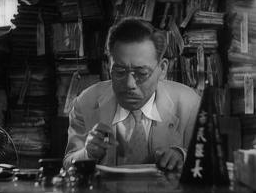
IKIRU (TO LIVE)
The life of Kanji Watanabe, giving existential effort in the modern bureaucratic system as the “Chief of Public Relations Department” is shown in this movie directed in 1952 by Akira Kurosawa, one of the major directors of the Japanese movie sector.
The hero of the movie, Kanji Watanabe, works as the chief and senior-level manager of the public relations department of the municipality; in other words, he preserves his position. The best way of preserving the position is by doing nothing. In brief, our hero is not managing his department but preserving the status quo in the municipality where he has served for 30 years.

Source: http://www.janusfilms.com/films/1056
The movie starts when a group of women residents in the neighborhood asks the municipality to fix an empty area where dirty water accumulates and to make a playground instead. Saying “it is not our job”, Kanji Watanabe immediately leads women to the engineering department. In fact, he gets rid of them, which starts a completely-tragicomic vicious circle. Each department, which women apply for, leads them to another unit with an explanation in its own way. In the end, women, walking around the town hall, visit the deputy mayor, and then come back to the public relations unit, where the vicious circle has started. As a last solution, Watanabe gets a written petition and puts it into a high pile of paperwork; in other words, he preserves his position skillfully again by doing nothing. It indicates the meaningless processes of the bureaucratic system dramatically.

Source: http://www.janusfilms.com/films/1056
The chief of the department, Watanabe, being about to achieve the record of coming to work for 30 years without any permission, is in a great shock after learning that he has stomach cancer and then he quits going to work. Following the great shock, our hero wakes up from a deep and long-term sleep like a mummy, called by his subordinates. Feeling too close to death, Watanabe gets lonely day by day and loses his motivation; thus he starts to search for the meaning of life.

Source: https://movierdo.com/akira-kurosawas-masterpiece-ikiru-1952-review-analysis/
He continues to search for it by making friendship with a young lady officially, working as his subordinate in his department. He thinks that she is the only one having the energy of life. The only thing he needs to learn from her is how she can be full of life. In the meantime, both his family and officials at the municipality spread lots of gossip about Watanabe. Saying nothing to his family and colleagues about his illness, the department chief discovers the meaning of life after all.
Coming back to his office in colleagues’ surprised looking, Watanabe immediately finds the petition submitted by women for the playground. Until his death, he insists on making the playground and gets in contact with all units in the municipality. He even dares to fight with his superiors. Watanabe, whose struggle for this little playground becomes legendary, passes away after 5 months.
During the funeral held after Watanabe’s death, his colleagues discuss how he has changed in time, on the basis of his struggle for making the park and how the bureaucratic system itself has changed as well, and how they have been overwhelmed and trapped by the system, which indicates a self-criticism.
Comparing themselves to Watanabe and making an assessment, one official at the municipality faces himself and the bureaucratic system itself in fact and says; “...before working at the municipality some of us were good, but all, including myself, started to change while working”. Another one says; “you do not need to do anything there. Doing something means doing nothing in fact. We are expected to seem as if we were doing something but doing nothing in fact”. These expressions are so important that they indicate the degenerating effect of the bureaucratic system.
Watanabe’s colleagues at the municipality get surprised at his persistence, effort, and determination in his fight for making the playground. They discuss if his individual effort has surpassed the bureaucratic system. Another opinion opposes that individual efforts of Watanabe do not make sense since bureaucracy functions as an integrated system; therefore he cannot surpass it and if there is a success, it is not achieved by only one individual but by all. It makes us think about the meaning of the existential struggle of Watanabe.
One of the officials says; “When looking back, does this struggle make any sense? He was crazy”. Another official replies to him; “the main point is that the World means darkness if his struggle does not make a sense”, which profoundly and dramatically presents how the bureaucracy works.
Dilek ŞAHİN

